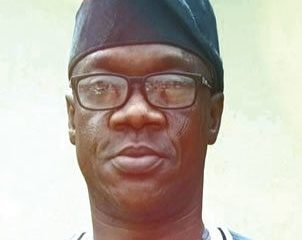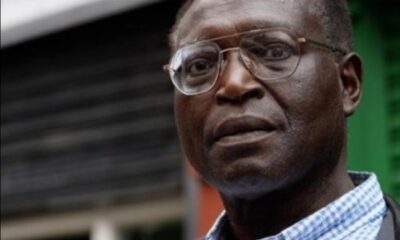News
OPINION: Minister Tahir Mamman And His Varsity Age Limit
Published
2 weeks agoon
By
Editor
By Suyi Ayodele
Oluwafemi Ositade is a 17-year-old student of the Ambassadors College, Ota, Ogun State. He is a child every parent would want, and every nation would adore and celebrate. The boy broke the internet recently when the news broke that the prodigy gained scholarships to 14 different universities outside the shores of Nigeria. According to the news, little Ositade who participated in the popular Scholastic Aptitude Test (SAT), scored a total of 760 marks out of 800 with a Cumulative Grade Points Aggregate (CGPA) of 4.04/4.0. The performance earned him full scholarships to many Ivy League universities such as Harvard in the United States of America, and other top-notch universities in Canada and the Middle East.
The universities that have offered the genius full scholarships include Harvard University, Brown University, Duke University, University of Toronto Lester B Pearson Scholarship, Wesleyan University, Carnegie Mellon University in Qatar, University of Miami, Howard University, Stetson University, Fisk University, University of Toronto, Mississauga Campus, University of Toronto St. George Campus, University of Toronto, Scarborough Campus and Drexel University. These universities are not concerned about the ‘maturity’ or otherwise of the 17-year-old boy. They are interested in his brilliance and what he could achieve in his cradle for the betterment of mankind. That is how advanced countries think. That is how those who run governments in sane climes project for the future. They are never tied down by antediluvian policies.
Last week, Nigerians were served with the sad news of the woeful performances of the candidates who participated in the Unified Tertiary Matriculation Examination (UTME). Of the 1.8 million candidates who sat for the examination, 1.4 million of them were said to have scored below 200 out of 400 marks. Terrible results! But while parents, guardians and Nigerians generally were bemoaning the horrible UTME results, the news broke that from inside the black pot, a whitish substance in terms of agidi (eko) had come out.
From the Bullamakanka town of Omu Aran, Kwara State, came the news of a 15-year-old genius, Olukayode Victor Olusola, who scored 362 marks in the same UTME. Olusola, a student of Government Secondary School, Omu Aran, scored 95 marks each in Mathematics, Physics and Chemistry and 77 in English Language. He intends to study Electrical Electronics Engineering at the University of Ilorin, Kwara State. That should be good news to his parents, his school and every human being with a good sense of merit. But we are in Nigeria. Despite this sterling performance, Olusola may have to wait for the next three years before he can fulfill his dream of a university education. Why? Someone high up there feels and thinks that a 15-year-old, who could study to score 362 marks out of 400 marks obtainable, is “too young” to be in the university. If the brilliant boy were to be an American, or a citizen of any of the other forward-looking Western countries, he would be celebrated. Here, we think in the opposite direction of where the advanced world faces! Too sad!
Penultimate week, precisely on Monday, April 22, 2024, our Minister of Education, Professor Tahir Mamman, was in the news. It was for, to be humorous and obsolete, the ‘wrongest’ of all reasons. The minister, while on an inspection of the UTME being held across the country then, said that the admission age for all undergraduate courses in our tertiary institutions would henceforth be 18 years. The position of the minister runs in contrast to the existing regulation in most universities, which is to the effect that a candidate must have attained the age of 16 years or would have done so on the first day of October in the year of his/her candidature. In 2022, the Senate Committee on Basic Education said that 16 years would be the age of admission. The Joint Admission and Matriculation Board (JAMB) Registrar, Professor Ishaq Oloyede, told the Senate Committee that JAMB had no powers to disqualify any candidate on the basis of age. He emphasised that individual universities could determine age to admit as the case maybe. Most universities peg their admission at 16 years. Obafemi Awolowo University, (OAU), Ile Ife, for instance, has no age limit. There was no age limit when I gained admission into the school in the late 80s and the situation remains the same till date. So, between our universities and the Minister of Education, who is right?
MORE FROM THE AUTHOR: OPINION: Where Are Yoruba’s Soldier Ants?
The minister, a professor and thinker, ‘justified’ his position on the age of admission to the university. According to him, parents who allowed their children to go into the university at the age of 16 “are pushing their children too much”. To arrest the situation, Mamman, after giving a pass mark for the conduct of the examination said: “The other thing which we noticed is the age of those who have applied to go to the university. Some of them are really too young. We are going to look at it because they are too young to understand what the university education is all about. That’s the stage when students migrate from a controlled environment where they are in charge of their own affairs. So, if they are too young, they won’t be able to manage properly. That accounts for some of the problems we are seeing in the universities. We are going to look at that. Eighteen is the entry age for university. But you will see students, 15, 16, going to the examination. It is not good for us. Parents should be encouraged not to push their children too much.” The minister then proffered a solution, to wit: The only solution to that is skills; by talking skills right from the time they entered school, from the primary school. Somebody should finish with one skill or another. That is part of the assumption of the 6-3-3-4 system…”
I have tried to rationalise what informed the minister’s posture without success. Why do we always think backward in this part of the world? All over the world, we see, and hear stories of child prodigies doing exploits. But here we are talking about a 16 or 17-year-old child being “too young” to be in the university. What about special children, the ones we call geniuses- the likes of Ositade and Olusola mentioned above? What do the advanced nations of the world do to them? Ositade, who in the estimation of Professor Mamman is “too young” to be in the university, has secured 14 different full scholarships outside Nigeria! This is where our problem lies as a nation.
If we accept the proposal by the minister, it means that a child who completed his or her secondary school education and passed all the qualifying examinations at the age of 16 would have to wait for another two years before he or she could be admitted into the university. What would such a child be doing at home for the two years interval? Are there government established intermediate vocational centres where such children could go? Or they would just be at home waiting for ‘old age’ to write their UTME? Did Professor Mamman give consideration to the damage the two-year break could cause? Under whose watch would the children be during the two-year hiatus? Do we talk about the possibility of waning enthusiasm, interest, frustration and other psychological effects? All these are by the way. It is obvious that the minister spoke from the point of ignorance. That indeed is very unfortunate in itself! The extant law on admission into tertiary institutions in Nigeria today pegs the age at 16 years. Any child who is 16 years of age by October of the year he or she seeks admission is qualified. There is nothing in the books for now to show that this position has changed. We copied a lot from the Western world. I think we should also copy their mode of education and the policies therein. We need to do this if indeed we must compete with them.
MORE FROM THE AUTHOR: OPINION: Why Were Miyetti Allah And Tinubu’s Iyaloja In Ibadan?
The oldest, and one of the best universities in the world, is the University of Oxford, United Kingdom. A check on the university’s admission requirements for undergraduate courses revealed that: “The University does not set any age requirements (except for the Medicine course: please see below), but applicants for all undergraduate courses will be expected to demonstrate a mature approach to the study of their subject which includes demonstrable skills of critical analysis, wide contextual knowledge and the ability to manage their time independently.” The only condition the university gives for intending undergraduate students below age 18 is as stated: “If you intend to begin your course before your eighteenth birthday, we recommend that you consult the college to which you are applying to discuss your application, as they will wish to consider provision for your welfare.” It is only candidates seeking admission in the university’s medical college that are required to be 18 years of age “at the time they start the Medicine course. The clinical contact in our programme starts in the first term and means that younger students would not be able to take part in required elements of the course. For Medicine, your application will not be shortlisted unless you will be at least 18 years old on the 1 November of your first term.”
The same applies to most Ivy League universities in the United States of America. Come to think of this. It is on record that Harvard University for example, had, as far back as 1909, that is 115 years ago, admitted an 11-year-old into the institution! William James Sidis (April 1, 1898- July 17, 1944) entered the university at age 11. Described as an “American child prodigy”, Sidis’ father first sought admission for him at age nine but was rejected by the university. Two years later, Boris Sidis, the psychiatrist father of the genius, convinced the university to admit his son, who is recorded in history as having “an IQ between 250 and 300 and conversant in 25 languages and dialects”. A year after his admission, Sidis was said to have “lectured the Harvard Mathematical Club on four-dimensional bodies”. One of those who met Sidis in Harvard, Norbert Wiener, in his book, “Ex-Prodigy”, said of Sidis thus: “The talk would have done credit to a first or second-year graduate student of any age…talk represented the triumph of the unaided efforts of a very brilliant child.”.
By the age of 16, Sidis, on June 18, 1914, left the university with a Bachelor of Arts degree. Imagine if Sidis were to be in the Nigeria of Mamman and the backward policy of age limit! Yet, we have many Sidis as our children in Nigeria. Yet again in the same Kwara State of Olukayode Victor Olusola, a Catholic secondary school, Eucharistic Heart of Jesus Model College (EHJMC), Ilorin, displayed 30 photographs of its students, who scored between 355 and 300 marks out of 400 obtainable marks in the same UTME. These children are between the ages of 15 and 17. Sadly, our Minister of Education said these ones are “too young” to be in the university. This is one of the reasons why in the year 2024, Nigeria still imports plastic toothpicks and calls it ‘dental floss’ to give it ostentatious status! How do we match up to a country, which 115 years ago rose above age limitation to accommodate the best from its educational system when in the mid-21st century, we still consider our 16-year-olds as “too young” to be admitted into our universities irrespective of their performances at the qualifying examinations?
MORE FROM THE AUTHOR:OPINION: Mike Adenuga’s 71 Resilient Steps
Most embarrassing from the minister is his allusion to the 6-3-3-4 system of education as a solution to the ‘immaturity’ of young undergraduates. To the best of my ignorance, Nigeria moved from the 6-3-3-4, to the current 9-3-4 system in 2004. That was when the State Primary Education Board (SPEB) changed to State Universal Basic Education Boards (SUBEB) across the states. By that change, primary and junior secondary (first nine years) came under SUBEB. Is the minister not aware of that, such that he would still be relying on a policy that was changed 20 years ago? This is one of the problems we have as a nation. The quality of the mental ability of those who superintend over every segment of our life speaks volumes. Granted that there is illiteracy in the land, but must our policy makers also be ignorant of the correct policies in their ministries and departments? Is anyone still wondering why we have not been able to make any headway? Can we get the respected Professor Oloyede of JAMB to whisper to the minister that his position on the age requirement for admission into tertiary institutions is wrong, and the minister should not mislead the children to think that they are below the constitutionally prescribed age? Such a bland announcement by the minister is capable of sending some children to depression.
It is gratifying to note that our fainéant senate is rising to the occasion, this time around, to curtail the pre-historic thinking of Minister Mamman on the age limit for admission into our universities. Senator Adeyemi Adaramodu, the Chairman, Senate Committee on Media and Public Affairs, was quoted to have described the stance of the minister as “just an opinion.” It had better be! Adaramodu, according to the reports, said that any adjustments to the age limit for admission into our universities would require proper legislative procedures, adding that if such a matter was brought before the senate, “there is going to be a public hearing. All the stakeholders will sit down and talk about it – the parents, teachers, legislators, civil society organisations, even foreign organisations.” Should the issue come up for debate in the National Assembly, I commend the two chambers to take the wisdom of Professor Dipo Kolawole, former Vice Chancellor, Ekiti State University, Ado Ekiti, who, while faulting Minister Mamman, said: “With global advancement in medicine, science and technology, age is no more a major determinant of capacity to cope with higher education but depth of knowledge. It is sheer backwardness to measure maturity principally on the basis of age.” Describing the minister’s position as “absurd” and “repulsive”, Kolawole posited that: “In America, China and others, people now obtain PhD at relatively young age. They are immediately recruited and deposited in their research laboratories and institutes to enhance technological advancement of their countries in a competitive world of science and technology.” One can only hope that Mamman, and many of his ilk, would be conscious enough to know that the world has moved beyond the level they are. Rather than depriving brilliant children of admission to tertiary institutions on account of their ages, the government should develop policies that would make the universities to grow to the level that they would begin to make “provision for your (their) welfare”, of Mamman’s “too young” undergraduates. It is wrong for Nigeria to keep engaging the reverse gear while other nations of the world are moving at supersonic speed.
The writer, Mr. Suyi Ayodele is a senior journalist, South-South/South-East Editor, Nigerian Tribune and a columnist in the same newspaper. This article was first published by Nigerian Tribune. It is published here with permission from the author.
You may like

Paramount ruler in Mbo Local Government Area (LGA) of Akwa Ibom state, HRM Ogwong Okon A. Abang, has been kidnapped in his palace at Ebughu.
The abduction was said to have been carried out at about 9pm on Saturday. Recall that doctors in the state have downed tools over the kidnap of their colleague, Dr John Robbin Esu, who remains in the kidnappers den nearly three weeks after.
Like the case of Dr. Esu who was kidnapped in Oron LGA, the kidnap of the Paramount Ruler of Mbo, has raised more concern over the collapsed security architecture in Oron nation.
READ ALSO: Okuama/Okoloba Impasse: Women Protest In Black Attire, Raise Issues [PHOTOS]
Only last week, the wife of Chief Asukwo Eweme Ulap Okon, aka Levile, a prominent political figure was also abducted in Oron.
Akwa Ibom State Police Command was yet to offer a word on the monarch’s abduction, but Commissioner of Police, CP Waheed Ayilara and other service Commanders were moving to the Ebughu Palace of the victim at the time of filing this report.

The National Drug Law Enforcement Agency, NDLEA has arrested four members of a drug cartel who runs a cocaine cartel from India in Lagos with a Sports Utility vehicle and two houses belonging to the syndicate, already traced to them sealed for forfeiture to the Federal Government.
This is just as a couple, Kazeem Omogoriola Owoalade (alias Abdul Qassim Adisa Balogun) and Rashidat Ayinke Owoalade (alias Bolarinwa Rashidat Ayinke), also members of the cartel have been declared wanted by NDLEA in connection with cocaine trade.
Spokesman of the agency, Femi Babafemi who made this known, said “Two other members of the syndicate, Imran Taofeek Olalekan and Ishola Isiaka Olalekan were arrested on April 3, 2024 following their bid to export 3.40kg cocaine on a Qatar Airlines flight going to Oman through the Murtala Muhammed International Airport, MMIA Ikeja Lagos.
“While Imran was the courier conveying the drug consignment to Oman, Ishola recruited him for the head of the cartel, which investigation has now revealed to be Alhaji Kazeem Omogoriola Owoalade whose Indian residence permit bears Abdul Qassim Adisa Balogun based in India.
“Efforts to dismantle his network in Nigeria paid off after five weeks of surveillance and follow up operations when another member of the syndicate, Hamed Abimbola Saheed who works directly with the baron was arrested on Tuesday 14th May at Abule Egba area of Lagos.
“It was indeed Saheed who lodged Imran in a hotel a day before his aborted trip to Oman and equally dropped him and Ishola at the Lagos airport the day they were arrested.
READ ALSO: Never Accept Luggage Without Knowing Its Content — NDLEA Warns Travellers
“During a search of Hamed house, NDLEA operatives recovered some phenacetine, a cutting agent for Cocaine, weighing 900 grams.
“He confessed that the recovered substance was what was left of the consignment Imran was taking to Oman the day he was arrested.
“His arrest led to a follow up operation at the home of the Owoalade couple at 20 Eyiaro street, Ogudu Orioke, Lagos where another suspect was arrested and a new model Toyota RAV4 SUV marked FKJ-773 JJ belonging to Rashidat and additional 400 grams of Cocaine recovered in addition to already prepared suitcases to be used for illicit drug concealment, digital weighing scales and other paraphernalia”.
In the same vein, NDLEA officers of the Directorate of Operations and General Investigations, DOGI, attached to a courier firm in Lagos on Wednesday 15th May intercepted two parcels, containing Cocaine and Amphetamine concealed in steel bolts and shea butter.
While the cocaine weighing 587 grams, was concealed in eight steel bolt screws going to China, the Amphetamine consignment packed in vape pens and hidden in shea butter was going to the United Kingdom.
Attempts by Emeka Nwadiaro (aka Mega) to export 3.6kg Loud, a strain of cannabis concealed in 36 water flasks to Dubai, UAE was also thwarted at a logistic company in Port Harcourt, Rivers state on Thursday 16th May while a swift follow up operation led to the arrest of the owner of the consignment, Emeka Nwadiaro in Onitsha, Anambra state same day.
READ ALSO: NDLEA Intercepts Qatar-bound Drugs, Officers Reject N5m Bribe
While NDLEA operatives in Lagos intercepted a mercedes benz bus loaded with 840kg cannabis and arrested the driver, Samuel Henry, at Olojo in Ojo LGA, Lagos, another suspect, Lawal Adam was nabbed along Otukpo road, Aliade, Benue state on Friday 17th May with 75,000 pills of opioids including tramadol and exol-5.
Two suspects: Olisa Etisi, 32, and Jonathan Umeh, 25, were arrested along Owerri – Onitsha road, Imo state following the discovery by NDLEA operatives of a big gas cyclinder used to conceal six blocks of Loud, a strain of cannabis weighing 3.85kg.
In Borno state, 70-year-old Adamu Mohammed was arrested at Mbulamel, Biu LGA on Thursday 16th May with 2kg cannabis and 33.55grams of diazepam, while Gaddafi Sani, 27, was arrested with 30 kilograms of cannabis along Abuja-Kaduna road, Kaduna.
In Yobe state, a consignment of 91.1kg opioids and 13kg cannabis going to Maiduguri, Borno state, was recovered from hidden compartments of a petrol tanker along Potiskum-Damaturu road by NDLEA officers who arrested the driver, Ismaila Ali.
No less than four suspects were arrested in connection with the seizure of 2,025 pieces of improvised explosive devices (IED) materials intercepted in a Toyota hummer bus marked AGL 905 XX by NDLEA officers along Agaie – Lapai road, Niger state.
The duo of Abdulrauf Shitu Adeyemi, 46, and Asmiyu Rahim, 45, conyeying the IED materials were arrested on the spot. Follow up operations led to the arrest of Husaini Abdullahi, 25, at Sokoto main market, Sokoto and Nazifi Abdullahi, 37, at Naibawa Motor Park, Kano on Friday 17th May.
The Chairman/Chief Executive of NDLEA, Brig Gen Mohamed Buba Marwa (Retd) has directed that all four suspects and the explosive materials be transferred to the appropriate security agency for further investigation.
READ ALSO: Atiku Hints On Supporting Obi For 2027 Presidential Race
In another operation, Muhammad Lawal, 42, was nabbed at Central Market Motor Park, Katsina State with 1,000 Ampoules of Pentazocine injection.
Also, a total of 105kg cannabis was on Friday 17th May recovered from a house at Obola community, Owan West LGA, Edo state and a suspect, Gloria Oris arrested when NDLEA officers raided the area.
In Kwara state, two suspects: Abdulganiyu Karaman, 55, and Sunday Abel, 37, were on Saturday 18th May arrested with 83kg cannabis and tramadol at Boriya, Baruten LGA, and Offa respectively.
With the same vigour, the various commands of the Agency across the country continued with the War Against Drug Abuse, WADA, advocacy campaign in the past week.
Some of them include: WADA sensitisation lecture for students and teachers of Government Girls Science secondary school, Malumfashi and Government Girls Science Secondary School, Daudawa, Katsina; Government Girls Science College, Tunga Magajiya Rijau LGA, Niger state.
Others are students and teachers of St. Theresa’s College Oke-Ado, Ibadan, Oyo state; students of Government Girls Secondary School, Tudun Wada, Kano; students of Dein secondary school, Imobi secondary school and St. Columbas Grammar School, Agbor, Delta State.
While commending the officers and men of the MMIA, Rivers, Lagos, Kano, Kaduna, Yobe, Borno, Niger, Benue, Kwara, Imo, and Edo Commands of the Agency as well as those of DOGI for their outstanding feats in the past week, Chairman/Chief Executive Officer of NDLEA, Brig. Gen. Mohamed Buba Marwa (Retd) said the efforts have further affirmed the cardinal role of NDLEA in the security architecture of the country.
He equally applauded their counterparts in all the commands across the country for intensifying their WADA advocacy lectures to create a fair balance between their drug supply reduction and drug demand reduction activities.
News
SERAP Sues 36 Governors, FCT Minister Over FAAC Allocations
Published
2 hours agoon
May 19, 2024By
Editor
The Socio-Economic Rights and Accountability Project has sued Nigeria’s 36 governors and the Minister of the Federal Capital Territory, Abuja,Nyesom Wike.
They were sued for failing “to account for the spending of trillions of Federation Account Allocation Committee allocations collected by their states and the FCT since 1999″.
This was contained in a release on Sunday by SERAP’s Deputy Director, Kolawole Oluwadare.
The release said the lawsuit followed reports that the FAAC disbursed N1.123 trillion to federal, state, and local governments for March 2024. They shared N1.208 trillion in April. States collected N398.689 billion in March while they collected N403.403 billion in April.
In the suit numbered FHC/ABJ/CS/666/2024 filed last Friday at the Federal High Court, Abuja, SERAP asked the court to “direct and compel the governors and Wike to publish spending details of the FAAC allocations collected by their states and the FCT since 1999 including the list and locations of projects executed with the money.”
READ ALSO: SERAP, BudgIT, Others Drag CBN To Court Over Cybersecurity Levy
The organisation also asked the court to “compel the governors and Mr Wike to invite the Economic and Financial Crimes Commission and the Independent Corrupt Practices and Other Related Offences Commission to probe any allegations of corruption linked to the allocations and to monitor how the money is spent”.
It argued that, “Nigerians ought to know in what manner public funds including FAAC allocations, are spent by the governors and FCT minister.”
“Opacity in the spending of the FAAC allocations collected by the governors and Mr Wike would continue to have negative impacts on the fundamental interests of the citizens,” SERAP said.
It noted that trillions of FAAC allocations received by Nigeria’s 36 states and the FCT have allegedly gone down the drain.
It believes that, “Directing and compelling the governors and FCT minister to provide the information sought and widely publish the spending details of the FAAC allocations collected by them would serve legitimate public interests.”
READ ALSO: JUST IN: SERAP Drags 36 Govs, Wike To Court Over N5.9tn, $4.6bn Loans
It added, “The failure by the governors and the FCT ministers to account for the spending of the FAAC allocations collected by them is entirely inconsistent and incompatible with the Nigerian Constitution 1999 [as amended] and the country’s international anti-corruption obligations.”
The suit filed on behalf of SERAP by its lawyers Kolawole Oluwadare, Kehinde Oyewumi and Andrew Nwankwo, read in part, “States and the FCT should be guided by transparency and accountability principles and proactively account for the spending of the FAAC allocations collected by them.
“Secrecy in the spending of FAAC allocations collected by the governors and the FCT minister also denies Nigerians the right to know how public funds are spent. Transparency in the spending would allow them to retain control over their government.
“The governors and FCT minister have a legal obligation to provide the information sought including the list of specific projects completed with the FAAC allocations collected, the locations of any such projects and completion reports of the projects.
“The information sought should also include details of the salaries and pensions paid from the FAAC allocations collected, as well as the details of projects executed on hospitals and schools with the FAAC allocations.
READ ALSO: Account For N5.9tn, $4.6bn Loans, SERAP Gives Sani, Wike, Others Ultimatum
“Despite the increased FAAC allocations to states and FCT, millions of residents in several states and the FCT continue to face extreme poverty and lack access to basic public goods and services”
It added, “The reported removal of petrol subsidy and the floating of the exchange rate by the Federal Government has translated into increased FAAC allocations to states and the FCT. However, there is no corresponding improvement in the security and welfare of millions of Nigerians.
“FAAC allocations received by the states and the FCT are reportedly characterised by mismanagement, diversion of funds, and abandoned projects. FAAC allocations have also been allegedly spent for other purposes such as election campaigns and political patronage.
READ ALSO: SERAP, 20 Others Sue Akpabio, Abbas, Others For Increasing Own Budget By N147bn
“Publishing the documents on the spending of FAAC allocations by the states and the FCT would promote transparency, accountability, and reduce the risks of corruption in the spending of the funds.
“Publishing the documents would also enable Nigerians to meaningfully engage in the implementation of projects executed with the FAAC allocations collected.”
SERAP noted that the report that “some 140 million Nigerians are poor suggests corruption and mismanagement in the spending of trillions of naira in FAAC allocations collected by the states and the FCT”.
No date has been fixed for the hearing of the suit.

Gunmen Kidnap A’Ibom Monarch

Couple Declared Wanted Over Cocaine Seizures
JUST IN: Helicopter Carrying Iran’s President Crashes
Trending

 Entertainment5 days ago
Entertainment5 days agoVIDEO: Drama As Portable Jumps Gate To Evade Police Arrest

 Entertainment5 days ago
Entertainment5 days agoPolice Arrest Portable

 News4 days ago
News4 days agoSanwo-Olu’s Deputy Chief Of Staff Is Dead

 News4 days ago
News4 days agoAbure Bows To Pressure, Begs NLC President For Reconciliation

 Headline4 days ago
Headline4 days agoPolice Give Tips On How To Report Erring Officers

 News3 days ago
News3 days agoUK Denies 74-year-old Mam Permanent Residency After 42 Years Stay

 Headline3 days ago
Headline3 days agoFG, States, LGs Share N1.2tn In May

 News3 days ago
News3 days agoLady Reveals Three Ways To Know If A Girl’s Waist Beads Is Not ‘Ordinary’

 Headline4 days ago
Headline4 days agoKudos As Nigeria Gains Additional Territory ‘Five Times The Size Of Lagos’

 Headline3 days ago
Headline3 days agoHarry & Meghan: Outrage As UK Journalist Says Nigerians Are Nazis

































